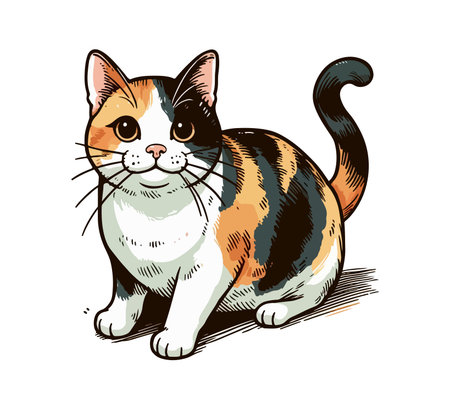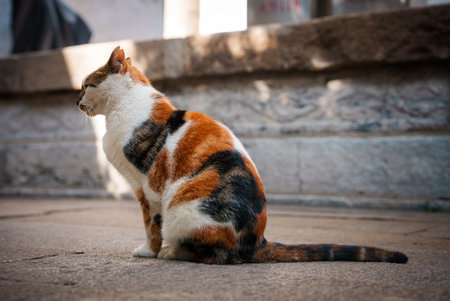1. Understanding Popular Cat Breeds in India
Cats have become an integral part of many Indian households, offering companionship and comfort amidst our busy lives. In cities from Delhi to Bengaluru and even in smaller towns, you will find a variety of cat breeds sharing homes with families. Among these, the Indian Billi (or Indian Domestic Cat) is the most common and beloved for its adaptability and playful nature. The Persian cat, recognised by its long luxurious fur and calm temperament, is also a favourite in many urban apartments. Siamese cats, known for their striking blue eyes and chatty personalities, add a unique charm to any home. British Shorthair cats are gaining popularity as well, admired for their plush coats and gentle disposition. Each of these breeds comes with its own set of traits—while some are independent and low-maintenance, others need more attention and grooming. Understanding your cat’s breed is the first step towards providing the right care, ensuring they stay healthy and happy in the Indian environment.
2. Balanced Diet Tips for Desi and Pedigree Cats
Ensuring your feline friends, whether Desi or pedigree breeds like Persian, Siamese, or Maine Coon, get a balanced diet is crucial for their health, especially considering the unique Indian climate and lifestyle. In India, many pet parents combine commercial cat food with local kitchen ingredients to give their cats nutritious and tasty meals. Below are some practical tips to help you make the best choices:
Local Food Options & Indian Kitchen Ingredients
Cats in Indian homes often enjoy a mix of packaged food and home-cooked treats. While it’s important to avoid onions, garlic, and spicy masalas, there are several Indian kitchen ingredients that are both safe and beneficial for cats when given in moderation.
| Ingredient | Benefits | Serving Suggestion |
|---|---|---|
| Boiled Chicken (unseasoned) | Lean protein source | Small shredded pieces |
| Plain Rice | Easily digestible carb | Mix with chicken or fish |
| Pumpkin (boiled/mashed) | Fibre for digestion | A spoonful mixed into food |
| Curd (unsweetened) | Probiotics for gut health | A small spoon occasionally |
| Boneless Fish (steamed) | Omega-3 fatty acids | Small, boneless servings |
Suitable Cat Food Brands in India
If you prefer ready-made cat food, several brands are tailored to suit Indian cats’ needs. Here are some popular and trusted options:
| Brand Name | Main Features |
|---|---|
| Whiskas | Easily available; variety of flavours; suitable for all breeds including Desi cats. |
| Me-O | Pocket-friendly; available in both dry and wet forms; good for daily feeding. |
| Royal Canin | Breed-specific formulas; premium quality; supports coat health and digestion. |
| Shetkar’s Drools | Indian brand; affordable; good protein content. |
| Purepet | Budge-friendly; made for Indian conditions; supports overall growth. |
Portion Control & Hydration Tips for the Indian Climate
The hot and humid weather across much of India means cats need extra care with portion sizes and water intake. Overfeeding can lead to obesity, while under-hydration can cause urinary issues—especially common during peak summer months.
Key Tips:
- Follow the feeding guidelines on cat food packs but adjust portions based on your cat’s activity level and age.
- Avoid leaving wet food out too long—especially during summer—as it spoils quickly in Indian temperatures.
- Add a little water or broth (without salt or spices) to dry kibble to encourage hydration.
- Ensure multiple bowls of clean, fresh water are available around the house. Consider using earthen pots to keep the water cool naturally.
- If possible, use stainless steel or ceramic bowls instead of plastic to prevent bacterial growth.
- Treats should not exceed 10% of daily calorie intake—even if your cat loves paneer or boiled egg yolk as a snack!
A balanced diet combining local wisdom with modern nutrition goes a long way in keeping both Desi and pedigree cats healthy and happy in our Indian homes.

3. Grooming and Hygiene Suitable for Indian Weather
When it comes to keeping your cat healthy in India, grooming and hygiene routines need to be adapted to our unique climate. The Indian weather, with its hot summers, humid monsoons, and mild winters, can affect how you care for both indoor and outdoor cats.
Bathing Frequency: Less is More
Cats are naturally clean animals and usually do not require frequent baths. In most Indian households, a bath every 4-6 weeks is enough unless your cat has gotten into something particularly messy or sticky. During the monsoon season, however, mud and humidity may make occasional baths necessary, especially for long-haired breeds like Persians or Maine Coons. Always use a gentle cat-specific shampoo and dry them thoroughly to avoid fungal infections that are common in damp weather.
Brushing Routines: Adapted to Coat Type
Regular brushing is key for all breeds but the frequency depends on your cat’s coat type. For example, short-haired breeds like the Indian Billi (Indian Domestic Cat) may only need brushing once a week, while long-haired cats should be brushed at least 2-3 times a week. Brushing not only removes loose fur but also helps distribute natural oils, keeping the coat shiny and reducing hairballs—a common issue in our climate.
Managing Shedding: Indoor vs Outdoor Cats
Shedding can increase during seasonal changes, especially before summer and after monsoon. Indoor cats shed less compared to those who spend time outside, but both benefit from regular grooming. Vacuuming frequently and providing scratching posts can help manage fur around your home.
Special Attention During Monsoon and Summer
The monsoon brings high humidity which can lead to skin problems if your cat’s fur stays damp for too long. Ensure your cat has a dry place to rest and check their paws for mud or fungal infections. In summer, cats may groom themselves more to cool down—make sure they have access to fresh water and shaded areas indoors. For outdoor cats, wipe their paws when they come inside to remove any harmful residues from roads or gardens.
By adjusting your grooming routines according to the Indian seasons and being mindful of breed-specific needs, you’ll help your cat stay happy, healthy, and comfortable all year round.
4. Exercise and Playtime: Keeping Your Cat Active
Maintaining an active lifestyle is essential for your cat’s overall well-being, especially for popular breeds like the Indian Billi, Persian, Siamese, and Maine Coon. While many Indian homes are flats or apartments with limited space, you can still ensure your cat gets enough exercise with simple, desi-inspired play ideas and easily available toys.
Simple Desi-Inspired Play Ideas
- Ghar Ka Jugaad: Use household items like old dupattas or cloth strips to create dangling toys. Cats love chasing anything that moves!
- Paper Balls: Roll up used paper (like from newspapers or notebooks) into small balls—watch your cat bat them around the house.
- Cardboard Boxes: Every Indian home has extra boxes lying around. Make tunnels and hide treats inside to encourage exploration.
Recommended Toys Available in Indian Markets
| Toy Type | Popular Brands in India | Best For |
|---|---|---|
| Feather Teasers | Heads Up For Tails, M-Pets | Siamese, Indian Billi |
| Catnip Toys | Trixie, Pawzone | Maine Coon, Persian |
| Interactive Balls | Kennel Kitchen, Basil | All breeds in flats |
Home-Friendly Exercise Tips for Apartments
- Create vertical spaces using shelves or window perches so your cat can climb and observe the outside world.
- Schedule two daily play sessions of 10-15 minutes each using interactive toys or homemade options.
- If you have a balcony with grills, let your cat sunbathe under supervision—most cats love basking in the morning sun.
Breed-Specific Activity Suggestions
| Breed | Activity Type |
|---|---|
| Siamese & Indian Billi | Loves chasing feather teasers and running after crumpled paper balls. |
| Maine Coon | Enjoys climbing shelves and exploring cardboard forts. |
| Persian | Puzzle feeders and gentle play with soft toys suit their laid-back nature. |
Key Takeaway:
No matter the breed or size of your living space, regular playtime and creative exercise will keep your cat healthy and happy in any Indian home.
5. Vaccination and Vet Care in the Indian Context
When it comes to ensuring a long and healthy life for your feline companion in India, staying updated with vaccinations and proper vet care is crucial. Popular cat breeds like the Persian, Siamese, or even the Desi cat need protection against common diseases such as rabies, feline panleukopenia, calicivirus, and rhinotracheitis. In India, vaccination schedules might vary slightly due to regional health risks and local climate conditions, so always consult with a vet familiar with your city or town’s environment.
Vaccination Schedules Tailored for Indian Cats
The first round of vaccinations usually begins at 8 weeks of age, followed by boosters every 3-4 weeks until your kitten is about 16 weeks old. Annual boosters are highly recommended because of higher exposure risks in Indian neighborhoods—especially if your cat interacts with street cats or spends time outdoors. Always keep your vaccination card handy and set reminders on your phone for upcoming booster shots.
Dealing with Street Cat Exposure
Indian cities are known for their vibrant street cat population. This means indoor cats can sometimes come into contact with outdoor felines through windows, balconies, or during brief outings. It’s best to ensure your pet is up-to-date on core vaccines and consider optional ones like feline leukemia based on your vet’s advice. Regularly check for ticks and fleas, especially during monsoon months when infestations are common.
Choosing Vet Clinics Nearby
Access to reliable veterinary care is improving in urban India but can still be limited in smaller towns. Look for clinics registered with the Veterinary Council of India or seek recommendations from local pet groups on WhatsApp or Facebook. Proximity matters—a nearby clinic ensures you can respond quickly during emergencies. Many urban vets now offer home visits, which can make annual check-ups less stressful for both you and your cat.
Annual Health Check-Up Tips
Don’t wait for signs of illness before taking your cat to the vet. Annual health check-ups should include dental exams, parasite control, blood tests, and body weight monitoring—all tailored to the breed and lifestyle of your cat. Discuss region-specific concerns like dehydration during hot summers or respiratory issues during Delhi’s smoggy winters. A proactive approach helps your furry friend stay healthy amidst India’s unique challenges.
6. Seasonal Health Precautions in India
Tips for Managing Cats During Extreme Summers
Indian summers can be harsh, especially in cities like Delhi, Mumbai, and Chennai where temperatures often cross 40°C. Keep your cat indoors during the peak afternoon heat, and ensure there is always fresh, cool water available. Place ceramic bowls in shaded corners as they stay cooler than plastic ones. You can also keep a wet towel near their resting spot or use a small fan directed away from your cat to maintain comfort. Avoid vigorous play during daytime; instead, schedule playtime during early mornings or late evenings when it is cooler.
Caring for Cats in the Monsoon Season
The monsoon brings humidity and dampness, which can cause fungal infections and ticks. Regularly check your cat’s fur for any signs of skin issues or parasites. Dry your cat’s paws with a soft cloth if they walk on wet surfaces, and clean litter trays more frequently to prevent odours and bacterial growth due to excess moisture. Ensure that windows are secured with grills or nets to prevent adventurous cats from slipping out onto slippery ledges or balconies.
Managing Your Cat During Diwali and Festive Periods
Indian festivals like Diwali are filled with lights and fireworks, which can be stressful for cats. Loud noises may scare them, causing anxiety or even health issues. Prepare a safe space in your home — a quiet room with closed windows, their favourite bedding, toys, and perhaps some calming music to drown out external sounds. Draw curtains to reduce flashes from firecrackers. If your cat shows signs of severe stress (like hiding excessively or refusing food), consult your local vet about pheromone diffusers or mild sedatives appropriate for Indian breeds such as the Indian Billi or Persian.
Extra Holiday Care Tips
- Remind family members not to feed sweets or oily snacks to cats during celebrations — stick to their usual diet.
- If you have guests over, let them know that some cats may get anxious around strangers and need space.
Stay Observant Year-Round
No matter the season or festival, regular observation of your cat’s behaviour is essential. Quick action on any change in appetite, mood, or appearance will help keep your furry friend healthy throughout the year in India’s unique climate.

